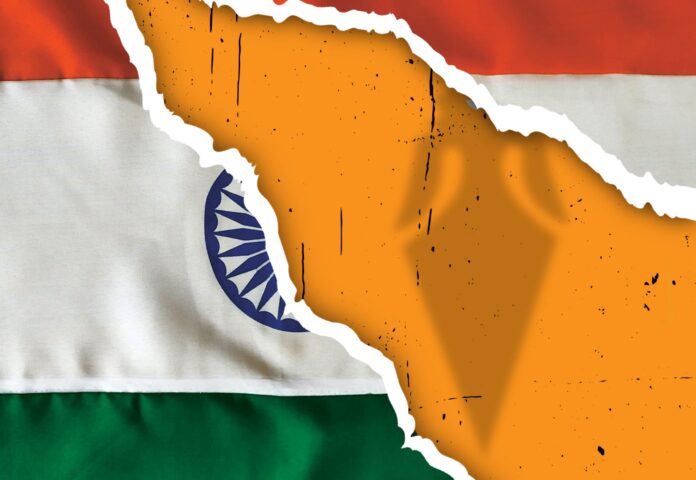As India celebrates its 78th Independence Day, the nation finds itself grappling with a fundamental question: What has happened to the secular fabric that once held the country together? The decline of Indian secularism is not just an alarming trend; it is a crisis that threatens the very essence of the Republic. While the discourse around Indian secularism has traditionally centered on the Hindu-Muslim binary, a deeper, more insidious force has been at play—the neglect of caste. This oversight has weakened the foundation of secularism, allowing the rise of Hindutva, a force that seeks to reshape India into a homogenous Hindu nation.
Seventy-eight years ago, when India gained independence from British colonial rule, the leaders of the nation envisioned a secular state where all religions and communities could coexist peacefully. The Indian variant of secularism, however, was heavily influenced by an elite, upper-caste perspective, which framed secularism primarily as the management of Hindu-Muslim relations. In doing so, it sidelined the pervasive and centuries-old caste system that continues to oppress millions of Indians.
B.R. Ambedkar, the principal architect of the Indian Constitution and a fierce critic of the caste system, recognized the dangers of this narrow approach. Ambedkar argued that true secularism in India could not be achieved without addressing the caste question. For him, secularism was not merely the absence of religious conflict but the presence of social equality, where individuals are not discriminated against based on their birth. Unfortunately, Ambedkar’s warnings were largely ignored, and the Indian state’s secular project continued to overlook the caste system.
This neglect has had profound consequences. While the state focused on maintaining religious harmony between Hindus and Muslims, the caste system continued to thrive, often intersecting with religious identities to further marginalize Dalits and other oppressed communities. The rise of Hindutva, which seeks to establish India as a Hindu Rashtra (Hindu nation), has further complicated this dynamic. Hindutva ideology, championed by organizations like the Rashtriya Swayamsevak Sangh (RSS) and its political arm, the Bharatiya Janata Party (BJP), promotes a vision of India that is not only exclusionary to religious minorities but also reinforces caste hierarchies.
Hindutva’s ascendance has been marked by an aggressive assertion of Hindu identity, often at the expense of India’s pluralistic traditions. Under the guise of promoting Hindu unity, Hindutva has co-opted upper-caste interests, marginalizing lower-caste Hindus and other minorities. The rhetoric of Hindutva is steeped in caste-based discrimination, often portraying Dalits and Adivasis as “lesser” Hindus or even as anti-national elements. This exclusionary narrative is not just a byproduct of Hindutva but is central to its ideology. The failure of the Indian secular state to address caste has thus created fertile ground for the growth of such divisive ideologies.
The consequences of this shift are evident in the rising incidents of violence against Dalits and Muslims, the increasing influence of caste-based organizations in politics, and the erosion of social justice measures. The politicization of religion and caste has polarized Indian society, with the secular ideals of the Constitution being increasingly undermined.
On this 78th Independence Day, it is crucial to reflect on how far India has strayed from the ideals of its founding fathers. The secularism that once defined the Indian Republic is now under siege, not only from religious extremists but also from the systemic inequalities perpetuated by caste. The Indian state’s historical neglect of caste has allowed Hindutva to exploit these divisions, leading to a situation where both religious minorities and lower-caste communities find themselves increasingly marginalized.
The rise of Hindutva has been accompanied by a concerted effort to rewrite Indian history, often with a focus on glorifying Hindu rulers and downplaying the contributions of non-Hindu communities. This revisionist history serves to further entrench the idea of India as a Hindu nation, sidelining the diverse and pluralistic traditions that have shaped the country. The glorification of figures like Nathuram Godse, the assassin of Mahatma Gandhi, and the demonization of figures like B.R. Ambedkar, who fought for the rights of the oppressed, are indicative of this dangerous trend.
As India celebrates its independence, it must also confront the uncomfortable reality that the very secularism it once prided itself on is now in decline. The decline of Indian secularism is not just a symptom of religious intolerance but a result of the state’s historical neglect of caste. The caste system, which continues to permeate every aspect of Indian society, has been allowed to flourish unchecked, creating deep divisions that Hindutva has been all too eager to exploit.
To reverse this decline, India must reimagine its secularism by centering it on social justice and equality. This requires a deliberate effort to dismantle the caste system and promote genuine religious and social harmony. Ambedkar’s vision of a secular India, where caste and religion do not dictate an individual’s fate, must be revived and integrated into the national consciousness.
The Indian state must also recognize that the battle for secularism is not just a fight against religious extremism but also against social inequality. Only by addressing the twin evils of caste and communalism can India hope to restore its secular fabric and fulfill the promises of its Constitution.
The future of Indian democracy hinges on its ability to address these challenges. As the nation celebrates its 78th Independence Day, it must also renew its commitment to the ideals of secularism, not as a mere slogan, but as a lived reality for all its citizens. The legacy of Indian independence is at stake, and the choices made today will determine whether the country remains a beacon of secularism or succumbs to the forces of division and exclusion.



